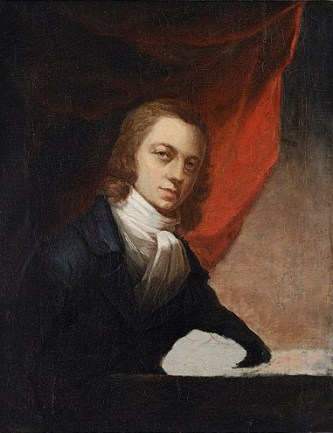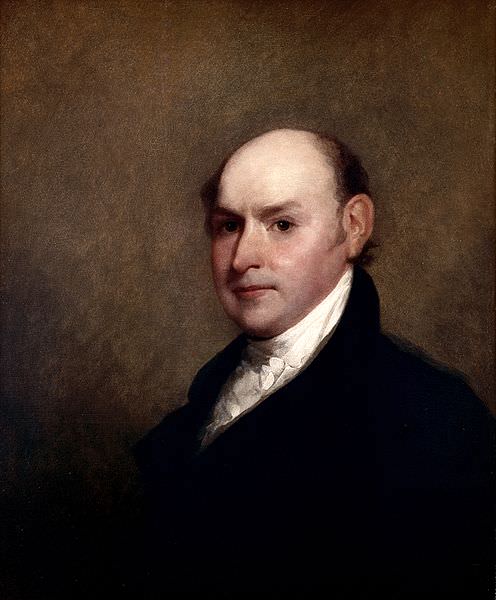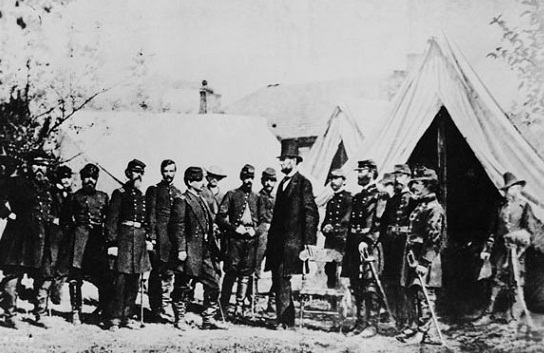A New Trade
“[Mr. Burr] assures me we will add another [star] soon enough to it.”
“You trust the man?”
“With my life.”
A conversation between George II and Alexander Hamilton after the adoption Reid Resolution, which led to the creation of the current model of the US Flag.
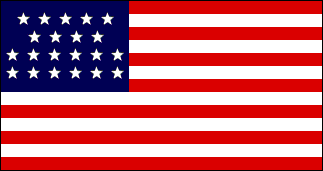
13 Stripes and a star representing each state would become the new model after the Reid Resolution. By its adoption there were 21 stars representing Delaware, Pennsylvania, New Jersey, Georgia, Connecticut, Massachusetts, Maryland, South Carolina. New Hampshire, Virginia, New York, North Carolina, Rhode Island and Providence Plantation, Vermont, Kentucky, Tennessee, Ohio, Louisiana, Indiana, Mississippi, Mayne.In May 1818, a couple with their two sons made their way to Quebec City. He was a lawyer who wished to enter politics, and his father-in-law was currently stationed in Quebec. His father had connections too, but his father-in-law had more grace in the field. She had yet to see her father since the war ended and he had never seen his second grandchild. On the way there they saw a man with a wagon and a busted wheel. He had important business in town and asked for help delivering his equipment. The wife hesitated, but they offered to help him into the city. They were shocked to learn they were to meet the same man, General Burr.
The man they aided was Martin Ferguson, who had for whatever reason feel out of Burr’s good grace. Clément Gosselin may have warned Burr, who he had known since the War for American Dominion, that any Ferguson could not be trusted. Burr tried not to be the kind of man who judged another by who their parents, Hamilton taught him that, but Ferguson was a turncoat. However, as he liked to point out to Burr, “my father stayed loyal unlike you. [Quebec] will be an empty wasteland or full of turncoats.” Ferguson had a business scheme, and Burr was the man that he could exploit. Burr currently was a man without wants, anything he requested as military governor was approved from men, supplies, and weapons. The business had been extremely well for Ferguson during the war, but now the government kept a good eye on those purchasing firearms. The possibility of rebellion was too high.
Ferguson introduced to him his first design for the Dual Barrel Pistol. He remarked it as being, “a crude and ridiculous piece of machinery. That lacked accuracy and procession but looked big and strong, and that may have been enough to fool the Americans.” It was not enough to fool Burr who wore three pairs of gloves when firing the first shot. It singed his hand as it burst apart. Burr may have had Ferguson thrown out of his office or even trialed for attempting an assassination. He would have if he did not need the man for another task. Colonel Miles Irwin, who had been visiting French military camps since the war ended, had some ideas he wanted to work on. He was told that Ferguson was the only man that had a chance in helping him. Martin Ferguson was called Hephaestus for good reasons. He had some inventions he wished to see forged, but neither had the time nor technology available for it to happen. He agreed to take up Irwin’s request for new cannon design and Burr was glad to have him out of his hair.

Martin Ferguson unlike Hephaestus was known to be a handsome man.The marriage between Philip and Theodosia was a healthy one. One can not say they were arranged like other marriages in the American aristocracy as Philip did proposed after asking for Burr’s blessing. After his wife died, Theodosia was the most important person in his life besides Alexander Hamilton. The relationship between Theodosia and Alexander could always be considered quite warm; he attempted to be like a father to all his in-laws. However, ties between Philip and Burr could be described as cold and distant. There was no hatred or even dislike, the both had a degree of respect for each other, but they were never family.
Philip came for advice hoping to win a seat in the New York State Legislature. When he asked what his father said he told them he had not told him of his intentions to run in 1819. Philip may have wanted to separate himself from his father or wished to achieve this on his own, but still needed the advice of a seasoned politician. He gave him helpful hints on how orate, who to get close to and what topics he should focus on, but the most important advice was on immigration. “Georgia, the Carolinas, maybe Virginia will be stuck as they were when I was a young man, but not New York. She’s changing still either be ready or lose what you have.”
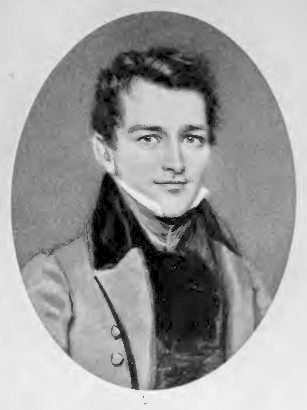

Philip and Theodosia near the time of their wedding“The Spanish Empire is no more,” French Ambassador, Antoine-François Andréossy, said to an aide after informing King Joachim that France would not send additional troops to reinforce Peru. Spain was left a broken mess after the Iberian War. They were indebted to France and lost most of their colonies in the New World. They tried and failed to stage an uprising in Gibraltar, but the weapons they were sending into the city were confiscated, and they lost international prestige. Napoleon told his brother to focus on rebuilding his state before reclaiming his empire.
His holdings in the East Indies were still secure even if his closest root through Mexico was no longer an option. Joachim hoped to increase trade with Qing China. China had limited the trade and influence Europeans were able to use. Many products brought by Westerners were not desired by the Chinese except for opium. Opium had yet become the huge juggernaut it would be later in the 19th century, but its sale was increasing. Spain did not have opium fields like the British, but many Chinese mixed their opium with tobacco. Though Cuba was lost, Spain still had other tobacco rich colonies.
During the summer of 1819, François Cabarrus, a French financial advisor, was sent to with several ships full of tobacco, but silver, firearms, and exotic fruits. Having made their way to Canton, they discovered lackluster deals for their imports, so Cabarrus opted to sail further North to sell their goods. It is unknown whether he was ignorant of Canton system in China, that focused all foreign trade to the one city, or if he believed the close alliance between France and Spain would gain him special treatment. Like all foreigners, Napoleon was seen as a barbarian compared to the Daoguang Emperor, who had just been crowned.

Daoguang EmperorMaking their way North, possibly to Nanjing, their vessels were seized, and the crew arrested. The quick action against the Spanish was due to Daoguang Emperor’s crackdowns on the opium trade. Though there was no opium on the vessels, rumors spread that the Spanish were trying to get into the trade which was mostly true. He waited for three months in prison until a French Consul was able to have him released. His cargo was still seized and given to Daoguang Emperor as a gift of friendship between the Spanish and Chinese.
When Cabarrus returned to Spain in 1821, having made not profit and selling no cargo, Joachim demanded a joint expedition against China. “Peking will burn their heathen emperor brought before God and judged.” Napoleon did not want to go to war with China, not yet. He put an end to his brother’s plans of rampage but would not let China’s attack against him go away. In 1824, the young Lieutenant Adam Bain was sent to Canton to reach out an unlikely ally. He would have to convince Cheng I Sao to come out of retirement and become the Pirate Queen once more.

Adam "the Bastard Sailor' Bain
“You trust the man?”
“With my life.”
A conversation between George II and Alexander Hamilton after the adoption Reid Resolution, which led to the creation of the current model of the US Flag.

13 Stripes and a star representing each state would become the new model after the Reid Resolution. By its adoption there were 21 stars representing Delaware, Pennsylvania, New Jersey, Georgia, Connecticut, Massachusetts, Maryland, South Carolina. New Hampshire, Virginia, New York, North Carolina, Rhode Island and Providence Plantation, Vermont, Kentucky, Tennessee, Ohio, Louisiana, Indiana, Mississippi, Mayne.
The man they aided was Martin Ferguson, who had for whatever reason feel out of Burr’s good grace. Clément Gosselin may have warned Burr, who he had known since the War for American Dominion, that any Ferguson could not be trusted. Burr tried not to be the kind of man who judged another by who their parents, Hamilton taught him that, but Ferguson was a turncoat. However, as he liked to point out to Burr, “my father stayed loyal unlike you. [Quebec] will be an empty wasteland or full of turncoats.” Ferguson had a business scheme, and Burr was the man that he could exploit. Burr currently was a man without wants, anything he requested as military governor was approved from men, supplies, and weapons. The business had been extremely well for Ferguson during the war, but now the government kept a good eye on those purchasing firearms. The possibility of rebellion was too high.
Ferguson introduced to him his first design for the Dual Barrel Pistol. He remarked it as being, “a crude and ridiculous piece of machinery. That lacked accuracy and procession but looked big and strong, and that may have been enough to fool the Americans.” It was not enough to fool Burr who wore three pairs of gloves when firing the first shot. It singed his hand as it burst apart. Burr may have had Ferguson thrown out of his office or even trialed for attempting an assassination. He would have if he did not need the man for another task. Colonel Miles Irwin, who had been visiting French military camps since the war ended, had some ideas he wanted to work on. He was told that Ferguson was the only man that had a chance in helping him. Martin Ferguson was called Hephaestus for good reasons. He had some inventions he wished to see forged, but neither had the time nor technology available for it to happen. He agreed to take up Irwin’s request for new cannon design and Burr was glad to have him out of his hair.
Martin Ferguson unlike Hephaestus was known to be a handsome man.
Philip came for advice hoping to win a seat in the New York State Legislature. When he asked what his father said he told them he had not told him of his intentions to run in 1819. Philip may have wanted to separate himself from his father or wished to achieve this on his own, but still needed the advice of a seasoned politician. He gave him helpful hints on how orate, who to get close to and what topics he should focus on, but the most important advice was on immigration. “Georgia, the Carolinas, maybe Virginia will be stuck as they were when I was a young man, but not New York. She’s changing still either be ready or lose what you have.”

Philip and Theodosia near the time of their wedding
His holdings in the East Indies were still secure even if his closest root through Mexico was no longer an option. Joachim hoped to increase trade with Qing China. China had limited the trade and influence Europeans were able to use. Many products brought by Westerners were not desired by the Chinese except for opium. Opium had yet become the huge juggernaut it would be later in the 19th century, but its sale was increasing. Spain did not have opium fields like the British, but many Chinese mixed their opium with tobacco. Though Cuba was lost, Spain still had other tobacco rich colonies.
During the summer of 1819, François Cabarrus, a French financial advisor, was sent to with several ships full of tobacco, but silver, firearms, and exotic fruits. Having made their way to Canton, they discovered lackluster deals for their imports, so Cabarrus opted to sail further North to sell their goods. It is unknown whether he was ignorant of Canton system in China, that focused all foreign trade to the one city, or if he believed the close alliance between France and Spain would gain him special treatment. Like all foreigners, Napoleon was seen as a barbarian compared to the Daoguang Emperor, who had just been crowned.

Daoguang Emperor
When Cabarrus returned to Spain in 1821, having made not profit and selling no cargo, Joachim demanded a joint expedition against China. “Peking will burn their heathen emperor brought before God and judged.” Napoleon did not want to go to war with China, not yet. He put an end to his brother’s plans of rampage but would not let China’s attack against him go away. In 1824, the young Lieutenant Adam Bain was sent to Canton to reach out an unlikely ally. He would have to convince Cheng I Sao to come out of retirement and become the Pirate Queen once more.
Adam "the Bastard Sailor' Bain




